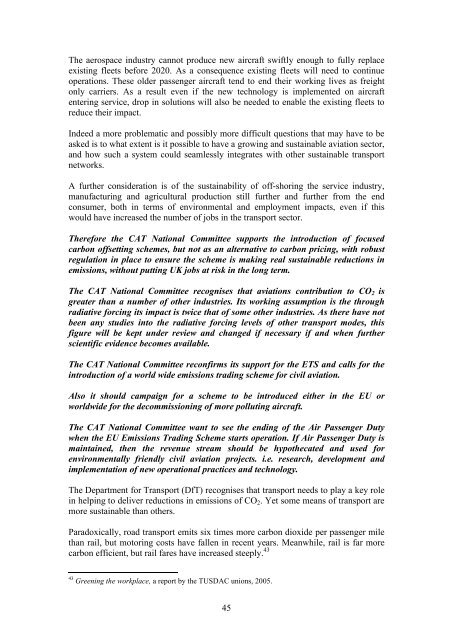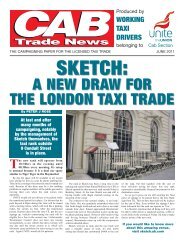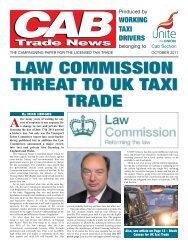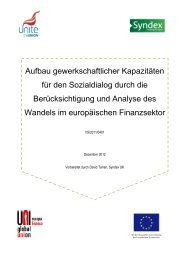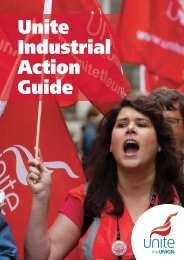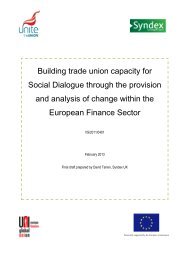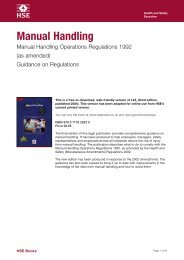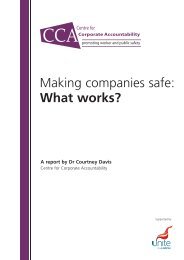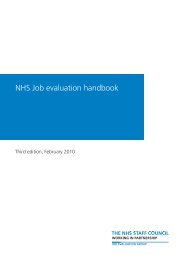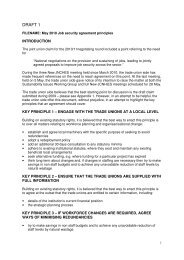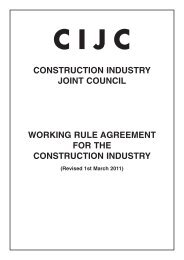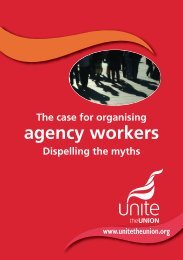Sustainable Transport and the Environment Guide - Unite the Union
Sustainable Transport and the Environment Guide - Unite the Union
Sustainable Transport and the Environment Guide - Unite the Union
You also want an ePaper? Increase the reach of your titles
YUMPU automatically turns print PDFs into web optimized ePapers that Google loves.
The aerospace industry cannot produce new aircraft swiftly enough to fully replace<br />
existing fleets before 2020. As a consequence existing fleets will need to continue<br />
operations. These older passenger aircraft tend to end <strong>the</strong>ir working lives as freight<br />
only carriers. As a result even if <strong>the</strong> new technology is implemented on aircraft<br />
entering service, drop in solutions will also be needed to enable <strong>the</strong> existing fleets to<br />
reduce <strong>the</strong>ir impact.<br />
Indeed a more problematic <strong>and</strong> possibly more difficult questions that may have to be<br />
asked is to what extent is it possible to have a growing <strong>and</strong> sustainable aviation sector,<br />
<strong>and</strong> how such a system could seamlessly integrates with o<strong>the</strong>r sustainable transport<br />
networks.<br />
A fur<strong>the</strong>r consideration is of <strong>the</strong> sustainability of off-shoring <strong>the</strong> service industry,<br />
manufacturing <strong>and</strong> agricultural production still fur<strong>the</strong>r <strong>and</strong> fur<strong>the</strong>r from <strong>the</strong> end<br />
consumer, both in terms of environmental <strong>and</strong> employment impacts, even if this<br />
would have increased <strong>the</strong> number of jobs in <strong>the</strong> transport sector.<br />
Therefore <strong>the</strong> CAT National Committee supports <strong>the</strong> introduction of focused<br />
carbon offsetting schemes, but not as an alternative to carbon pricing, with robust<br />
regulation in place to ensure <strong>the</strong> scheme is making real sustainable reductions in<br />
emissions, without putting UK jobs at risk in <strong>the</strong> long term.<br />
The CAT National Committee recognises that aviations contribution to CO 2 is<br />
greater than a number of o<strong>the</strong>r industries. Its working assumption is <strong>the</strong> through<br />
radiative forcing its impact is twice that of some o<strong>the</strong>r industries. As <strong>the</strong>re have not<br />
been any studies into <strong>the</strong> radiative forcing levels of o<strong>the</strong>r transport modes, this<br />
figure will be kept under review <strong>and</strong> changed if necessary if <strong>and</strong> when fur<strong>the</strong>r<br />
scientific evidence becomes available.<br />
The CAT National Committee reconfirms its support for <strong>the</strong> ETS <strong>and</strong> calls for <strong>the</strong><br />
introduction of a world wide emissions trading scheme for civil aviation.<br />
Also it should campaign for a scheme to be introduced ei<strong>the</strong>r in <strong>the</strong> EU or<br />
worldwide for <strong>the</strong> decommissioning of more polluting aircraft.<br />
The CAT National Committee want to see <strong>the</strong> ending of <strong>the</strong> Air Passenger Duty<br />
when <strong>the</strong> EU Emissions Trading Scheme starts operation. If Air Passenger Duty is<br />
maintained, <strong>the</strong>n <strong>the</strong> revenue stream should be hypo<strong>the</strong>cated <strong>and</strong> used for<br />
environmentally friendly civil aviation projects. i.e. research, development <strong>and</strong><br />
implementation of new operational practices <strong>and</strong> technology.<br />
The Department for <strong>Transport</strong> (DfT) recognises that transport needs to play a key role<br />
in helping to deliver reductions in emissions of CO 2 . Yet some means of transport are<br />
more sustainable than o<strong>the</strong>rs.<br />
Paradoxically, road transport emits six times more carbon dioxide per passenger mile<br />
than rail, but motoring costs have fallen in recent years. Meanwhile, rail is far more<br />
carbon efficient, but rail fares have increased steeply. 43<br />
43 Greening <strong>the</strong> workplace, a report by <strong>the</strong> TUSDAC unions, 2005.<br />
45


